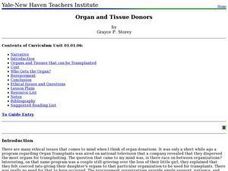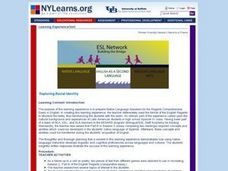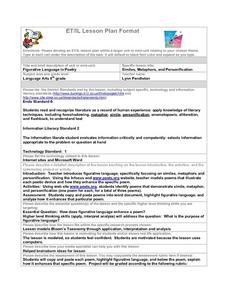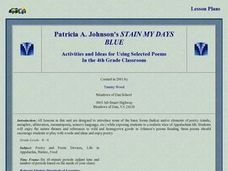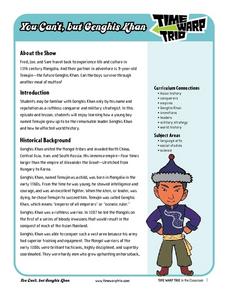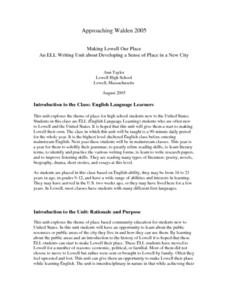Curated OER
Organ and Tissue Donors
Eighth graders discuss the ethical implications of organ donations. As a class, they examine the questions one must ask if they are considering becoming a donor. Using the internet, they read a poem and write a reflective paragraph on...
Curated OER
Presidents: Past and Present
Students identify George Washington and the current president and distinguish between past and present events. They listen to a text about Washington and make predictions. They generate a list of synonyms for past and present and...
Prestwick House
Catcher in the Rye Activity Pack
The Catcher in the Rye is the focus of a sampler that models some of activities included in a for-purchase packet based on J. D. Salinger's novel.
Curated OER
Teaching Money
Pupils identify the coins and bills used in the United States. They write the amounts of each bill and coin and practicing counting different amounts. They follow a demonstration about how to count money as well.
Curated OER
The Importance of Rivers in the Development of Early Civilizations Importance of Rivers in the Development of Early Civilizations
Sixth graders explore the role of rivers in the construction of early civilizations. In this importance of rivers lesson, 6th graders listen to a poem written by Langston Hughes and work cooperatively to develop a graphic organizer to...
Curated OER
D'Nile Is Where It's At!
Students travel down the Nile River to survey ancient Egypt in this unit of nine lessons. Data about pharaohs, hieroglyphics, growing crops, pyramids, the geography, and the sacred rituals are explored in this unit.
Curated OER
Remembering the First
Learners examine words and phrases associated with World War I as an introduction the era. They explore the legacy of World War I by reading and discussing "The War to End All Wars If Only." Students write obituries for fallen World...
Curated OER
Revision Lesson
Students, through a series of 4 lessons, explore what it means to revise their written work. They revise a bland story together and then practice revising their own papers by identifying the main action and "exploding" that moment into...
Curated OER
Africa
Students complete various activities related to the continent of Africa. They label and color a map of Africa, sing the Continent Song, view pictures and discuss animals of Africa, listen to the book "Bill and Pete Go Down the Nile,"...
Curated OER
ESL Network: Exploring Racial Identity
Twelfth graders drill for the Regents Comprehensive Exam in English by answering questions about selected readings as preparation for writing essays. After answering the questions, they compose essays adhering to formal written Spanish...
Curated OER
Understanding Primary Sources
Students draw conclusions from primary sources and share information and interpretations with a small group. They are introduced to the Jigsaw technique. Students discuss why a grocery receipt would be a primary source. They...
Curated OER
WEAVING TECHNOLOGY INTO THEMATIC UNITS
Fourth graders explore the planets by researching and writing a report about one of the nine planets.
Curated OER
Similes, Metaphors, and Personification
Eighth graders explore figurative language, specifically focusing on similes, metaphors and personification. They work on the web to identify poems that demonstrate simile, metaphor, and personification, then analyze how it enhances...
Curated OER
Exploring Literary Genre Through Latin American Literature
Students explore poetry and its meaning. After reading poems, students explore the literary elements such as the setting, character, problem, events and resolution. They compare and contrast descriptions given in poems. Students...
Curated OER
Stain My Days Blue
Students read several poems related to the life and culture of the Appalachia region. They are introduced to the poetic forms of simile, alliteration and onomatopoeia and respond to the poems through journal entries and poetry of their own.
Curated OER
Langston Hughes: Dream Variations
Students examine African-American communal life. In this Langston Hughes lesson, students read poetry by Hughes in order to gain insight into the Harlem community. Students select artwork that represents their community.
Curated OER
Seasons
Third graders draw a picture. For this seasons lesson, 3rd graders name the seasons of the year, discuss what happens during each season, read a poem for each season and draw a picture for each season.
Curated OER
You Can't, but Genghis Khan
Students study the life of Genghis Khan from his childhood to adulthood as a conqueror. They write poetry for two voices. They investigate how rules and laws are made and work together to problem solve.
Curated OER
Famous People Research Project
Fourth graders research a famous person in Michigan history. They will use at least three different resources including technology to conduct their research. They then will use various forms of technology to create individual research...
Curated OER
"The Pianist" As A Tool For Classroom Instruction About the Holocaust
Learners watch "The Pianist" to gain insight on the Holocaust and World War II. They write an essay based on ideas from the film and read a variety of poems and writings from the time period. In groups, they discuss the diffuculties of...
Curated OER
Reader's Theater
Learners act out and interpret the story for their peers. They study the simplest form of an organized reading to a more elaborate activity involving props, costumes, or a reinterpretation of the narrative into another art form.
Curated OER
Making Lowell Our Place
Students investigate a community through different types of educational experiences. They use short field trips to experience the community in real life. they also conduct research using a variety of resources. Then students build the...
Curated OER
Solid Waste
Students examine how to use their vocabulary, writing skills, and creative thinking to address environmental concerns in this unit. They write messages to using creative writing to address the issues of solid waste and recycling.
Curated OER
Culture in Atlantic Canada
Ninth graders discuss the aspects of culture and what makes them unique. In small groups, 9th graders use digital cameras to take photos. Groups use their pictures to create a PowerPoint presentation storyboard of their culture.


